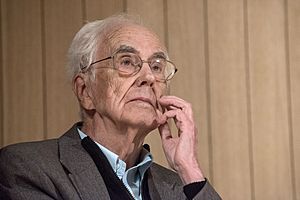Josep Maria Espinàs facts for kids
Quick facts for kids
Josep Maria Espinàs
|
|
|---|---|

Josep Maria Espinàs
|
|
| Born | 7 March 1927 |
| Died | 5 February 2023 |
| Occupation | Writer, journalist, publisher |
| Awards |
|
Josep Maria Espinàs i Massip (born 7 March 1927 – died 5 February 2023) was a famous writer, journalist, and publisher from Catalonia, Spain. He was well-known for his many novels, books about his travels, and articles in newspapers.
Espinàs wrote a huge number of books and articles. He received many important awards, including the Premi d'Honor de les Lletres Catalanes. In the 1960s, he helped start the Nova Cançó movement, which was a new style of Catalan music. He even helped create the famous song for the FC Barcelona football team, called El Cant del Barça.
Contents
Life and Education
Josep Maria Espinàs was born in Barcelona on 7 March 1927. He went to school with the Piarists until 1945. After that, he studied law at the Universitat de Barcelona and finished his degree in 1949.
In the same year he graduated, he won a prize for his very first article. He worked as a lawyer until 1955. Then, he started working for a publishing company called Editorial Destino.
In 1983, he received a special award called the Creu de Sant Jordi. This award is given to people who have done great things for Catalonia.
Espinàs also helped start his own publishing company, La Campana. He loved to travel, especially by walking! He walked through many parts of Catalonia and other areas of Spain. He wrote books about these trips. He also walked through much of Europe, Israel, India, Nepal, Thailand, Malaysia, Hong Kong, Japan, and the United States.
Becoming a Writer
Josep Maria Espinàs became well-known as a writer in 1953. He won the Joanot Martorell Prize for his novel Com ganivets o flames. After this, he became very successful with books like Dotze bumerangs (1954) and El gandul (1955).
His book Tots som iguals (1956) was even translated into English in the United States in 1961. It was called By nature equal. This book made him famous around the world. Important newspapers like the New York Herald Tribune and The New York Times praised his work.
In 1961, he won another award, the Premi Sant Jordi de novel·la, for his book L'últim replà. After this, he didn't write many novels for a while. Some exceptions were La collita del diable (1968) and Vermell i passa (1992).
In 1986, he published a very special book called El teu nom és Olga (Your name is Olga). It was a collection of letters he wrote to his daughter, who has Down syndrome. This book was very popular and was translated into many different languages.
The Nova Cançó Movement
In 1961, Espinàs was one of the people who started a music group called Els Setze Jutges. The name means "The Sixteen Judges." He sang Catalan versions of songs by Georges Brassens, traditional Catalan songs, and his own songs. He did this to help the Nova Cançó movement grow. This movement aimed to promote Catalan culture and language through new music.
When more professional Catalan singers started to appear, Espinàs stopped singing himself. He also wrote and recorded a story for children called Viatge a la Lluna (Voyage to the Moon). The music for this story was created by Xavier Montsalvatge.
In 2007, he received the Medalla d'Honor from the Parliament of Catalonia. This award recognized his important work with Els Setze Jutges.
Working as a Journalist
On 23 April 1976, Josep Maria Espinàs started writing a daily column for a new Catalan newspaper called Avui. His column was titled A la vora de.... He wrote it every day without stopping until January 1999. He won several awards for his newspaper writing.
Later, he moved to write for another newspaper, El Periódico de Catalunya. He continued to write opinion columns there.
Espinàs also hosted television interview shows. Some of these included Personal i intrasferible on Canal 33, and Identitats on TV3 from 1984 to 1988. He also hosted Senyals on Canal 33 from 1989 to 1990.
See also
 In Spanish: Josep Maria Espinàs para niños
In Spanish: Josep Maria Espinàs para niños
 | Frances Mary Albrier |
 | Whitney Young |
 | Muhammad Ali |

